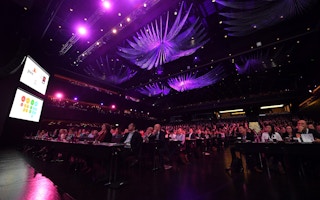As a journalist reporting on sustainable business issues in Asia and Australia, almost every event I cover involves senior corporate responsibility executives reaffirming their commitment to sustainability, and proudly describing achievements such as net zero emissions, renewable energy adoption, and supply chain traceability.
To continue reading, subscribe to Eco‑Business.
There's something for everyone. We offer a range of subscription plans.
- Access our stories and receive our Insights Weekly newsletter with the free EB Member plan.
- Unlock unlimited access to our content and archive with EB Circle.
- Publish your content with EB Premium.
Years of listening to corporate leaders explain why sustainability is not only valuable, but crucial to their companies, has left me feeling cautiously optimistic that big business is heading in the right direction when it comes to environmental responsibility, though it certainly has much room for improvement.
And these are not just empty promises; corporates are also delivering achievements such as Apple’s 100 per cent renewable energy powered data centres; Ferrero’s use of 100 per cent sustainable palm oil; and the 2,500 commercial and residential buildings worldwide that have achieved net-zero energy use, to name a few.
So imagine my surprise when I attended a two-day event in late May that was tipped as “the biggest congregation of senior executives in Australia”—the World Business Forum at Sydney’s The Star—only to find that climate change and sustainability issues received barely a minute of airtime at the two-day conference.
The event, organised by American outfit World of Business Ideas and attended by 2,000 people, featured nine lectures by business titans including Wikipedia creator Jimmy Wales, Huffington Post founder Ariana Huffington and former Apple advertising creative Ken Segall; as well as leading academics like Kellogg School of Management professor Mohanbir Sawhney, Melbourne Business School’s Ian Williamson, and renowned psychologist Daniel Goleman.
But across more than fifteen hours of discussions, the only mention of climate or environmental issues that I heard was during Melbourne Business School’s Williamson’s speech on leadership, when he briefly explained how the Paris Agreement on climate change was an example of changing regulations that will impact businesses.
Full disclosure: I had to miss the addresses by Huffington, Goleman and former Facebook marketing head Randi Zuckerberg due to other appointments, but nothing from the event agenda, highlight videos or social media chatter suggests that sustainability was discussed in these sessions at all.
The audience, too, showed little interest in the issue.
At almost every session, I tried to raise the issue through the conference’s mobile app—the only way to pose questions to the speakers—but it didn’t receive more than a handful of votes. And I only saw one other individual ask a similar question in the app.
The near-invisibility of climate and sustainability issues at the event was quite worrying, and it got me thinking: Are the sustainability-themed events I cover just an echo chamber for people with ‘sustainability’ or ‘responsibility’ in their job titles? Does the rest of the business community not care about these issues?
Sustainability matters
Of course, not every single business event has to discuss sustainability, let alone dwell on it at length. Neither did every session at the World Business Forum event lend itself to a conversation on the topic.
But surely they shouldn’t be almost entirely absent from an event whose promotional copy stresses that companies must “reinvent themselves constantly; experiment and learn; identify new opportunities, exploit them fast, and move on”; and where strategy, innovation, and leadership are key sessions themes.
Businesses will need these very traits to deal with the risks and threats posed by climate change, environmental degradation and resource scarcity; as well as cash in on the multi-trillion opportunities that lie in solving these challenges.
It’s also regrettable that an event that brought together the who’s who of Australia’s private sector all but ignored the issue, because it has moved from being a niche environmental interest to a mainstream concern about resilience and risk-proofing.
For one thing, climate change is one of the biggest threats to business longevity today. Extreme weather events, for instance, can disrupt operations or damage assets; while irregular rainfall patterns can cause crop failure and disrupt the food industry’s supply chains. And as investors move to shrink the carbon footprints of their portfolios, companies which fail to act risk losing out.
At the same time, sustainable development offers one of the greatest opportunities of our time. A recent report by the Business & Sustainable Development Commission—a group of private sector and civil society leaders—found that achieving the Sustainable Development Goals (SDGs) presents US$12 trillion in market opportunities globally.
The SDGs are a series of 17 targets that the world aims to meet by 2030. They include fighting climate change, protecting life on land and in water, eradicating poverty and hunger, and building sustainable cities and economies.
In Australia, industry group the Future Business Council predicts that environmental solutions such as clean energy, green buildings, hybrid vehicles and climate bonds are Australia’s “Next Big Boom”; and a multi-trillion dollar opportunity.
“
It’s also regrettable that an event that brought together the who’s who of Australia’s private sector all but ignored the issue, because it has moved from being a niche environmental interest to a mainstream concern about resilience and risk-proofing.
Clear connections
Environmental-blindness aside, the presentations at the World Business Forum on these topics were excellent. There was much that sustainability practitioners could learn from the presenters, and vice versa.
In her address on strategy, for instance, Harvard Business School professor Rosabeth M Kanter shared how American telecommunications company Verizon had initially refused to be the network carrier for the iPhone in 2007, but quickly abandoned its rigid, inward-looking stance when the iPhone’s success threatened Verizon’s market share. The company soon inked a collaboration with Google to promote rival operating system Android.
The lessons from this story—the importance of collaboration, agility, and strategic long-term vision— are certainly instructive for the massive transformations needed to avert environmental disaster. Replacing ‘take, make, waste’ models of consumption and production with closed loop systems and abandoning deeply entrenched fossil fuel-based energy systems for renewable energy systems are a few examples of the system-level change that we need.
Meanwhile, a discussion about how environmental challenges threaten to disrupt the status quo for not just business, but human society as a whole, would have added a new dimension to Melbourne Business School professor Ian Williamson’s insightful session on disruption. These issues lie at the heart of any discussion about the future of the economy.
Busting the echo chamber open
On the surface, the lack of airtime, or interest in environment-related topics might suggest that people aren’t doing anything about these challenges. But the sustainability track records of the companies speaking at, and sponsoring the events—whose employees accounted for much of the event’s audience—tell a different story.
Take the event’s major sponsor National Australia Bank, for example. The institution in 2010 became Australia’s first carbon neutral bank, has set ambitious emissions reduction targets, and although it continues to lend to the fossil fuel industry, the bank in 2015 also pledged A$18 billion to finance low-carbon activities by 2022.
Supporting sponsor Australia Post, too, has a long list of sustainability initiatives it supports, including the Carbon Disclosure Project (now known as CDP), the United Nations Global Compact, and the Global Reporting Initiative.
Companies aren’t indifferent to sustainability. So why are some of their staff so tuned out to the issue? Corporations have got to do more to mainstream sustainability and climate awareness at all levels of the organisation.
It might not be easy to sensitise thousands of workers to the issues, but the rewards will be rich: cost savings, long-term survival, better decision making, higher staff engagement, and even an improved brand image and public reputation. Industry-defining events such as the World Business Forum are a perfect place to get the conversation started.
The theme for 2018’s World Business Forum event in Sydney is Humanification, with a tagline that urges businesspeople to “focus on people, now and always’. I hope the global and Australian business leaders that convene in Sydney’s The Star casino next year will pay more attention to what, according to the United Nations is “the biggest threat facing humanity”.











